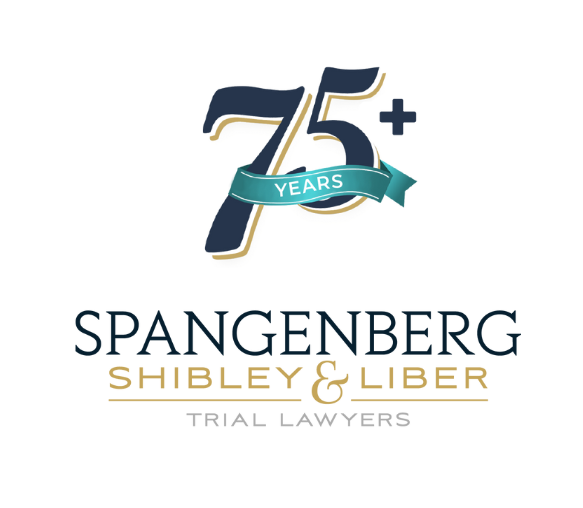Cleveland Cerebral Palsy Lawyers
Helping Families in Cleveland, OH
Families dealing with cerebral palsy often find themselves facing emotional, physical, and financial strains. The cost of medical treatments, ongoing therapy, adaptive equipment, and specialized education can quickly become overwhelming. Our legal team at Spangenberg Shibley & Liber LLP understands the multifaceted challenges associated with cerebral palsy and is committed to helping you secure the compensation needed to provide the best possible care for your loved one.
Contact our firm at (216) 600-0114 to schedule a free consultation and discuss your case with our compassionate and knowledgeable cerebral palsy attorneys in Cleveland.
What is Cerebral Palsy?
Cerebral palsy is a neurological disorder that affects a person's motor skills, muscle tone, and movement. It is often caused by brain damage during pregnancy, childbirth, or shortly after delivery. While the condition is not progressive, individuals with cerebral palsy may face lifelong challenges, requiring extensive medical care, therapy, and support.
Common types of cerebral palsy include:
- Spastic Cerebral Palsy: Characterized by muscle stiffness and difficulty controlling movements. May affect one side of the body (spastic hemiplegia), both legs (spastic diplegia), or all four limbs (spastic quadriplegia).
- Dyskinetic Cerebral Palsy: Involves uncontrollable, involuntary movements and may affect the entire body or only specific parts. Individuals may have difficulty sitting or walking due to uncontrolled writhing movements.
- Ataxic Cerebral Palsy: Affects balance and coordination, making movements shaky and unsteady. Individuals may experience difficulty with tasks requiring precise control, such as writing or buttoning a shirt.
- Mixed Type: Some individuals may exhibit a combination of spastic, dyskinetic, or ataxic features, leading to a mixed type of cerebral palsy.
Common Causes of Cerebral Palsy
Here are some of the common causes of cerebral palsy at different stages:
- Genetic Factors: While most cases of cerebral palsy are not directly linked to genetics, certain genetic factors can increase the risk of abnormal brain development. Genetic testing may be recommended for families with a history of neurological disorders.
- Infections: Infections during pregnancy, such as rubella, cytomegalovirus (CMV), or toxoplasmosis, can pose a risk to the developing fetus. Infections may lead to inflammation in the brain and result in cerebral palsy.
- Rh Incompatibility: Rh incompatibility between the mother and the baby's blood can lead to jaundice, which, if not properly managed, can result in brain damage and increase the risk of cerebral palsy.
- Multiple Pregnancies: Twins, triplets, or higher-order multiple pregnancies are associated with a higher risk of cerebral palsy. The increased likelihood may be due to factors such as premature birth and low birth weight.
- Placental Issues: Complications with the placenta, such as placental abruption or insufficient blood flow, can lead to oxygen deprivation in the developing fetus, potentially causing brain damage and cerebral palsy.
- Prolonged Labor: Prolonged labor can increase the risk of oxygen deprivation to the baby's brain. Medical interventions, such as the use of forceps or vacuum extractors, may be required to expedite delivery and reduce the risk of cerebral palsy.
- Breech Birth: When a baby is born feet or buttocks first, it can increase the risk of head trauma and oxygen deprivation, leading to cerebral palsy.
- Umbilical Cord Issues: Problems with the umbilical cord, such as a prolapsed cord or cord entanglement, can disrupt oxygen supply to the baby, potentially causing brain damage and cerebral palsy.
- Inadequate Monitoring: Inadequate monitoring of the baby's heart rate and other vital signs during labor can result in delays in identifying and addressing complications that may lead to cerebral palsy.
- Birth Asphyxia: Lack of oxygen during the moments immediately following birth, known as birth asphyxia, can lead to brain damage and contribute to the development of cerebral palsy.
- Neonatal Infections: Infections acquired shortly after birth, such as bacterial meningitis or encephalitis, can result in inflammation of the brain and increase the risk of cerebral palsy.
- Stroke or Bleeding in the Brain: Trauma, stroke, or bleeding in the baby's brain shortly after delivery can lead to cerebral palsy. These events may be associated with complications during childbirth or other medical conditions.
How is Cerebral Palsy Treated?
The optimal treatment plan varies based on the severity and specific challenges faced by each person. A multidisciplinary approach involving medical, therapeutic, and supportive interventions is often recommended.
Here are some key components of the treatment for cerebral palsy:
- Medications: Medications may be prescribed to manage spasticity, alleviate pain, or control seizures that can be associated with cerebral palsy. Muscle relaxants, anti-spasticity medications, and botulinum toxin injections are examples of drugs that may be used to address muscle stiffness and spasms.
- Orthopedic Interventions: Orthopedic surgeries, such as tendon lengthening or orthopedic corrections, may be recommended to improve joint alignment, mobility, and overall function.
- Seizure Management: If an individual with cerebral palsy experiences seizures, anticonvulsant medications may be prescribed to manage and control seizure activity.
- Physical Therapy: Physical therapists work with individuals with cerebral palsy to improve muscle strength, coordination, balance, and mobility. Customized exercises and stretching routines are designed to address specific physical challenges and prevent complications such as joint contractures.
- Occupational Therapy: Occupational therapists focus on enhancing daily living skills, fine motor skills, and independence. They may recommend adaptive equipment and strategies to improve functionality.
- Speech and Language Therapy: Speech therapists help individuals with cerebral palsy improve communication skills, including speech, language, and swallowing. Augmentative and alternative communication (AAC) devices may be introduced to facilitate communication.
- Recreational Therapy: Recreational therapy aims to improve recreational and leisure activities, promoting socialization and overall well-being.
- Aquatic Therapy: Water-based therapy can be beneficial for individuals with cerebral palsy, offering a supportive environment that reduces the impact on joints while promoting movement and flexibility.
- Mobility Aids: Wheelchairs, walkers, and braces may be recommended to enhance mobility and provide support for individuals with cerebral palsy.
- Powered mobility devices can offer greater independence for those with mobility limitations.
- Communication Devices: Augmentative and alternative communication devices, such as speech-generating devices or communication apps, can assist individuals with communication challenges.
- Adaptive Equipment: Customized tools and equipment, such as modified keyboards, utensils, and seating systems, can help individuals with cerebral palsy perform daily activities more independently.
- Individualized Education Plans (IEPs): For children with cerebral palsy, IEPs are developed to address their unique learning needs and provide necessary accommodations and support in the educational setting.
- Special Education Services: Access to special education services, including physical therapy and speech therapy within the school environment, helps promote academic success and social integration.
- Psychological Counseling: Individuals with cerebral palsy and their families may benefit from psychological counseling to address emotional and psychological challenges associated with the condition.
- Support Groups: Support groups provide a platform for individuals and families to connect, share experiences, and receive emotional support from others facing similar challenges.
Why Choose Us?
At Spangenberg Shibley & Liber LLP, we bring a wealth of experience and expertise to the table. Our team of dedicated attorneys has a proven track record of success in handling cerebral palsy cases. We understand the nuances of these cases, including the medical complexities, and we are well-versed in the legal strategies needed to secure favorable outcomes.
We recognize the emotional toll that cerebral palsy can take on families. Our approach is rooted in compassion and understanding. We work closely with our clients, taking the time to listen to their stories, concerns, and goals. This client-centric approach allows us to tailor our legal strategies to meet the unique needs of each family we represent.
Call (216) 600-0114 or fill out our online contact form to learn how we can help your child.
Commitment. Integrity. Results.
It's not just a motto. We'll stand by your side and fight for your rights.-
History of Excellence
Our firm has been helping individuals since 1946 and has secured billions of dollars on behalf of our clients.
-
Passionate Representation
We go the distance for you and your future fight to obtain maximum compensation on your behalf.
-
Unwavering Commitment
Our trial attorneys have tried hundreds of cases and are not afraid to take your case to trial.
-
Personalized Service
We offer one-on-one attention and detailed counsel. To us you are not just another case number.


